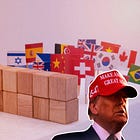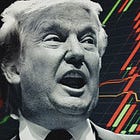Listen to Zooming In at The UnPopulist in your favorite podcast app: Apple Podcasts | Spotify | Google Podcasts | RSS | YouTube
Landry Ayres: Welcome back to Zooming In at The UnPopulist. I’m Landry Ayres.
When President Trump launched his so-called Liberation Day tariffs, he didn’t just ignite a global trade war—he may have also triggered yet another constitutional crisis. This week, first an international trade court and then a federal court ruled those tariffs unlawful, striking at the heart of Trump’s sweeping claims of executive power under the International Emergency Economic Powers Act. But almost immediately, an appeals court hit pause.
To help us unpack what these rapid developments mean—not just for trade policy, but for the separation of powers and the future of emergency authority in America—director of Executive Watch, Robert Tracinski, talked to George Mason University law professor, Ilya Somin. Somin is co-counsel in the case and the legal brains behind the lawsuit. They explore whether emergency powers have become a blank check for presidential overreach, and what this case could mean for rebalancing power between Congress and the White House.
We hope you enjoy.
A transcript of today’s podcast appears below. It has been edited for flow and clarity.
Robert Tracinski: Yesterday [Wednesday], we had a court ruling that Trump’s tariffs are unconstitutional. And then, just an hour or so before recording, we had another appeals court saying, “Well, hold off on that. We’re going to put a stay on that.” This has been very fast moving. So, can you tell us: What are the two courts involved here? What do the rulings mean so far?
Ilya Somin: So, I should note that I am co-counsel in the case that we’re talking about, together with the Liberty Justice Center. We represent five small businesses challenging the Trump “Liberation Day” tariffs, which have started the biggest trade war since the Great Depression. [Wednesday] night, the U.S. Court of International Trade—which is the trial court responsible for hearing cases relating to U.S. trade policy—agreed with us that these tariffs are illegal because the statute that Trump is relying on, the International Emergency Economic Powers Act of 1977, doesn’t grant him the kind of virtually unlimited tariff power he says he had.
They also said that if it did grant him that power, it actually would be unconstitutional because it would be a wildly excessive delegation of legislative power to the executive branch.
Now, the [Thursday] ruling is not any kind of ruling on the merits or reversal of the previous decision. It is what lawyers call an administrative stay, which in plain English means that they have temporarily stayed [Wednesday’s] decision to give the parties some time to argue about the issue of whether a longer-term stay should be imposed.
If that longer term stay is imposed, it would mean that the decision is stayed until the case is fully litigated on appeal, perhaps all the way to the Supreme Court. On the other hand, if the longer stay is denied, then the ruling will take effect probably in a couple weeks or so.
So there has not been any reversal. There has been just a very temporary stay of a kind that’s not unusual in litigation.
Tracinski: This is when they’ve overturned something, and they said, “This is illegal.” But then, “Well, we’re not going to put that decision into effect quite yet. So we have time for the appeals to play out.”
Somin: They haven’t even said that yet. This is essentially a stay to determine whether there should be a longer stay. They’re not even saying yet that there should be a stay pending appeal, as it’s called, which would, if it were instituted, mean the trial court ruling is stayed for the entire time that it takes to litigate appeals, which in this case could be some weeks or months.
Here, this is a much more temporary stay than that, and within two, three weeks, we should probably know whether there will be a longer stay or not. Though after that, there will still obviously be an appellate process on the merits of the decision where, first, the U.S. Court of Appeals for the Federal Circuit, and then possibly also the Supreme Court, if they want to intervene, will consider the issue of whether the trial court ruling should be upheld on the merits.
Tracinski: Before we get to the merits, on the substance, how likely do you think that this is going to have to go to the Supreme Court?
Somin: I don’t know. I think this case is more likely to make it to the Supreme Court than the average case, simply because of the enormous importance and the size of the power grab that is involved here.
But it’s entirely possible that the Supreme Court will decide not to take it. If they’re happy with the lower court decisions about the case, they might decide we can move on, and we don’t have to involve ourselves in this.
I think this case is more likely than the average to get to the Supreme Court. But for almost any case, the smart money will say it’s less likely that the case will get to the Supreme Court than that it won’t, given that they only take something like 60 or 70 cases per year.
Tracinski: But they’ve had a pretty crowded emergency docket so far in the last couple of months.
Somin: Yes, they have. And it’s possible that this case will ultimately make it to their emergency docket, but it’s also possible that it won’t. It’s also possible that it could make it onto their regular docket, but perhaps at an accelerated pace, which is what happened with an element of the birthright citizenship case recently.
Tracinski: Let’s go back to the merits of this, because this is all done under this I-E-E-E-P—how many Es are in there?
Somin: I-E-E-P-A, known to its friends as Eye-Yee-Pah.
Tracinski: But it’s this Emergency Powers Act. I once declared a national emergency of national emergencies, because we have all of these laws that give the president power to do something if there’s a national emergency, and of course the temptation is always for the president to say, “Yes, my wanting to get my agenda item on this particular thing, that’s an emergency, and we need to declare an emergency whether or not there is any actual basis for that.” So, Trump has said, “I declare an emergency, and that allows me to impose all the tariffs.”
There are a couple issues I want to unpack here. First, are there conditions under which the president actually has to show that there’s an emergency, other than that he feels like there is one?
Somin: Yeah, so the statute here has multiple requirements. One is that the president must declare a national emergency. But that by itself is not enough because the emergency has to be with respect to an “extraordinary and unusual” threat from abroad to the American economy or security.
What is the supposed threat in this case? It’s bilateral trade deficits that we have with a bunch of countries. And as we contend in our case—and the Court of International Trade largely agreed [Wednesday] night—there is judicial review of what counts as an extraordinary and unusual threat. It’s not enough for the president just to say, “This is an extraordinary and unusual threat.” And tariffs imposed to deal with trade deficits—that’s simply not an extraordinary and unusual threat. There’s nothing extraordinary or unusual about trade deficits. They’ve existed for many decades.
They’re not even a threat at all. Most economists will tell you that there’s simply not a problem. I have a huge trade deficit with my local supermarket. I buy a lot from them. Sadly, they virtually never buy anything from me, despite my efforts to get them to buy copies of my books. So that trade deficit definitely exists, but it’s not an emergency. It’s not extraordinary, unusual, and it’s definitely not a threat.
Similarly, if we happen to buy more from Canada or from Europe or some other country than we sell to them, that’s not an emergency or a threat. It simply means that we value the goods more than we value the money that we paid for them. And often it’s efficient. Instead of trying to produce everything ourselves, it’s efficient to buy some things from abroad that they can produce better, more cheaply, more easily than we can, so that we can focus our energy on other things—just like I buy most of my food at the supermarket and other stores, and I don’t try to grow my own food by having a farm in my backyard. The same applies here.
So the court rightly ruled that there is not an unlimited power of the president just to declare an emergency anytime he feels like it, and, on top of that, to say that whatever it is, is an extraordinary and unusual threat. Rather, they ruled that these are enforceable requirements that courts can take a look at.
Tracinski: This goes to the broader issue, though, of what is an emergency—because when Congress passes a law saying, “We give the president certain power in an emergency,” they’re basically saying this has to be a situation that is happening so quickly or so out of the blue or so unexpectedly that Congress can’t deal with it. There are all sorts of issues, like trade deficits, immigration, issues that Congress has hashed out and tried to deal with over a period of 40, 60, 100 years. By definition, that’s not an emergency.
Somin: That would be my view. In fairness, there’s some tradition of deference to the president in declaring what counts as a national emergency. In this statute, it’s not enough to say there’s an emergency. You also have to show an extraordinary and unusual threat, and there’s not such a tradition there.
We would also argue that this law is different from the National Emergencies Act of 1976, in that in this law, there is more evidence that the word “emergency” is supposed to have a real meaning as opposed to just being whatever the president says it is.
But even if the president can say that an emergency is whatever he says it is, that’s not also true of an extraordinary and unusual threat. Otherwise, that second requirement would be redundant. And a standard principle of legal interpretation is that unlike in ordinary language, where we say redundant stuff all the time, the presumption in interpreting laws is that we shouldn’t interpret them in ways that make provisions redundant.
Tracinski: Let’s go to the other aspect of it, though, which is that even if there is an emergency, the emergency powers granted in this law are not the power to unilaterally settle tariffs at whim.
Somin: There’s a question whether this law even imposes tariffs at all or allows their imposition, because it doesn’t mention tariffs. It just mentions a power to regulate international transactions, which is not the same thing. There’s actually another federal district court ruling issued [Thursday] which ruled against the Trump tariffs—another case which said simply, “IEEPA doesn’t allow the imposition of tariffs at all.”
“The statute has multiple requirements. One is that the president must declare a national emergency. But that by itself is not enough because the emergency has to be with respect to an “extraordinary and unusual” threat from abroad to the American economy or security. What is the supposed threat in this case? It’s bilateral trade deficits that we have with a bunch of countries. And as we contend in our case—and the Court of International Trade largely agreed [Wednesday] night—there is judicial review of what counts as an extraordinary and unusual threat. It’s not enough for the president just to say, “This is an extraordinary and unusual threat.” And tariffs imposed to deal with trade deficits—that’s simply not an extraordinary and unusual threat. There’s nothing extraordinary or unusual about trade deficits. They’ve existed for many decades. They’re not even a threat at all. Most economists will tell you that there’s simply not a problem.” — Ilya Somin
But even if it does allow the imposition of tariffs in some cases, [Wednesday] night’s ruling in our case says that it does not allow unlimited imposition of tariffs anytime the president wants. Rather, they have to be with respect to an actual extraordinary or unusual threat, and they have to be actually geared to counter that threat, as opposed to being only sort of loosely connected.
Tracinski: So, it’s not like a license to do whatever you want in response. It’s a license to do very narrow, specified things.
Somin: Yes. And they also said that if it was a blank check to issue any tariffs the president wants of any kind, that would be unconstitutional because the power to impose tariffs is specifically given to Congress in Article I of the Constitution, not to the president.
There’s some fuzziness in Supreme Court precedent about how much delegation is too much. But an unlimited power to start trade wars and impose tariffs as much as you want clearly crosses any plausible line. And that’s what the court said.
Tracinski: Let’s go back to the history of this. In the Constitution, Article I, Section 8, when it’s listing the powers of Congress, one of the first things it does is it says, “Congress has the power to do these things.” It has a long list of them. One of the very first things in there is ... they don’t use the word “tariff,” but they use an older term for the same thing.
Somin: Imposts.
Tracinski: “Imposts,” that’s the word. Basically, they give the tariff power, the power to put taxes on trade, to Congress to set.
If you go back in the history, most of the time that they had big trade wars and large tariffs—they had one in 1890 that they got very excited about—these were done by acts of Congress. And the last big one was Smoot-Hawley in 1930 that doesn’t exactly set off the Great Depression but kicks the U.S. economy down into this spiral. Somebody’s actually produced a sort of trade spiral [graph] showing how year after year, after that, international trade goes down. It basically helps crush the entire global economy.
I think what happened is Congress realized they screwed up trade so badly that, starting in 1934, they start passing laws, giving the power to set tariffs to the president.
Somin: So, it’s complicated. Obviously, there’s a long history. Originally, with the RTA [Reciprocal Tariff Tax] of 1934, the idea was actually to give the president some power to reduce tariffs to avoid future trade wars. Over time, there was a grant of some power to set tariffs in various statutes, like in the Trade Expansion Act of 1962, and there’s other history that we can talk about.
But the bottom line is that the IEEPA statute that we’re talking about in this case, (a) doesn’t even mention tariffs, and (b) was actually enacted in the aftermath of what were seen as abuses of various emergency powers by Richard Nixon and other presidents. So the idea was actually to limit powers compared to what existed before, rather than to grant vast new powers.
Tracinski: Let’s talk about the original purpose of IEEPA.
Somin: The original purpose of it was to simultaneously give the president some authority to deal with genuine international emergencies, but also to eliminate what Congress saw as various abuses of the Nixon era and before—like, when in the early 1970s, Nixon had used the predecessor statute of IEEPA, the Trading with the Enemies Act, to impose some tariffs to try to deal with the balance of payments crisis of the early 1970s. Congress and others thought that had gone too far, and they wanted to constrain that and also to constrain emergency powers generally.
If you look at the legislative history of this law you will find that, in a report by the House of Representatives, they say specifically that [they] want to ensure that emergencies are rare and brief and not “a normal situation.” This is obviously the exact opposite of what Trump is trying to do in this case, where he’s trying to turn into an emergency something which is completely normal.
But in order to prevent these kinds of abuses, they said not only that there must be an emergency, but also that it has to be an extraordinary and unusual threat. It’s clear from the context of the law that all of this is supposed to be judicially enforceable and not simply left up to the discretion of the executive.
Tracinski: The interesting thing, from what I recall from the history of it, is that following Smoot-Hawley there was a sense that we should give the president more power to negotiate on tariffs and trade because the president will have an incentive to reduce tariffs. Because the idea is, individual congressmen are beholden to different companies and industries in their districts. If you’re from Pennsylvania, you’re going to want to vote for steel tariffs because of the steel companies there.
The idea was that all the people in Congress are beholden to special interests who are going to want more trade restrictions. So we should give more negotiating power to the president, because he’s more likely to not be beholden—he answers to the whole country. He’s not going to have that incentive. He’s going to be more likely to reduce the trade barriers.
Somin: So, all of that is true, but all of that has little or nothing to do with IEEPA.
Tracinski: It’s interesting to see how that assumption has reversed.
Somin: Yeah, obviously we now have a president that is more protectionist than Congress and indeed more than mainstream public opinion.
Tracinski: So, where do we go from here? I mean, the tariffs are still whatever Trump last set them at, until this stay is removed. How do you expect this to work out in terms of where it’s going to go next?
Somin: Within the next couple of weeks, there will be a decision on whether to impose a stay or not. Regardless of that, there will be an appeal that’s going on already to the U.S. Court of Appeals for the Federal Circuit, which is the appellate court which has jurisdiction over the Court of International Trade.
I’m guardedly optimistic that we will win there—just like we won in the Court of International Trade. Because, in that court, we got a unanimous decision from a panel of three judges appointed by presidents of both parties, including one even appointed by President Trump, Judge Timothy Reif. He was seen as a person with protectionist sympathies. Insiders even told us when we drew him as part of our panel, “Look, this is a bad choice for you.” But even he was not willing to accept the claims to virtually unlimited tariff authority that the administration is making.
“If you look at the legislative history of [IEEPA] you will find that, in a report by the House of Representatives, they say specifically that [they] want to ensure that emergencies are rare and brief and not “a normal situation.” This is obviously the exact opposite of what Trump is trying to do in this case, where he’s trying to turn into an emergency something which is completely normal. But in order to prevent these kinds of abuses, they said not only that there must be an emergency, but also that it has to be an extraordinary and unusual threat. It’s clear from the context of the law that all of this is supposed to be judicially enforceable and not simply left up to the discretion of the executive.” — Ilya Somin
So we are hopeful. You can’t know for sure, obviously, but we are hopeful that we will win on appeal if the case gets to the Supreme Court, which is far from certain that it will. But we’re guardedly optimistic we can win there as well.
And if we do win, then these tariffs will be permanently gone.
Tracinski: And, basically, it’ll be pushed back to Congress. Congress will have the power once again.
Somin: Congress certainly could reenact them if they wanted to. But I think it’s very unlikely that they will.
Tracinski: Yeah, well, exactly. You push it to Congress, which means it goes back to where it was before and is unlikely to change radically.
Does this indicate anything about the issue of emergency powers in general? Trump is a guy who enjoys being able to sign executive orders and do things unilaterally, do things by his say-so. And so every emergency power that’s on the books is basically fodder for him to do this.
So will this have an effect in terms of serving notice that emergency powers are not an open-ended grant of authority to do whatever you want? And to what extent is that true of other emergency powers?
Somin: It’s a good question. The implications for other emergency powers depends to some degree on if we win and also what grounds we have. Because we have about six different arguments by which we can win—some of which have more implications for emergency powers than others.
To take the obvious, if they rule for us on the issue of the definition of emergency and they say that that’s a meaningful, judicially enforceable definition, then obviously that will have implications elsewhere. If they focus primarily on the definition of “extraordinary and unusual threat,” that will have important implications for the IEEPA statute, which itself is a good thing because the powers claimed here are so sweeping. It’ll have fewer implications for other emergency powers, except perhaps atmospheric ones, the idea that if you can interpret “extraordinary and unusual,” and if that’s judicially enforceable, then maybe “emergency powers” is as well.
There are other ways we could win that I could go over that might have greater or lesser implications for the scope of general emergency powers. But I think the basic idea is that while some types of rulings in our favor would have more impact on other emergency powers, any kind of win for us, at least at the margin, moves the needle towards legitimizing more judicial scrutiny of exercise of emergency powers.
And I would say that’s a good thing because while Trump is particularly egregious in abusing these powers, other presidents, including President Biden, have, too. There is a growing trend towards that kind of abuse, and it would be desirable to rein it in.
Or, as I said earlier, as Congress said back in the ’70s, we don’t want emergencies to be a normal state of affairs. We want it to be a rare and exceptional state of affairs for genuine, sudden crises that can’t be dealt with in any other way.
Judicial review is not the only tool we need to use to address that, but judicial review can help.
Tracinski: Talking about judicial review not being the only tool, Congress back in the ’70s, in response to Nixon, actually wrote a law about regulating national emergency powers and basically said, every six months, Congress can vote to eliminate one of these states of emergency. And the thing is, Congress has never even scheduled a vote to do that.
So, part of the problem we have here is that Congress has been happy to abdicate their power and say, “Let the president do that. That’s controversial—it’s a difficult vote. We don’t want to do it.”
This is why we have three co-equal branches of government. Because if Congress isn’t going to enforce its powers to limit the executive’s ability to declare emergencies, then we have this fallback, the courts. You can go to the courts and it’s judicially reviewable whether this is an emergency or not.
Somin: There’s certainly plenty of blame attached to Congress.
In fairness, when the National Emergencies Act was enacted in 1976, the original structure included a so-called legislative veto. After a period of several months, Congress would have the ability to vote to terminate a presidentially declared emergency and the president would not have the power to veto that. So, we wouldn’t need a two-thirds majority in each house to override a presidential veto—you just need a simple majority.
However, in 1982, in the case of INS vs. Chadha, the Supreme Court ruled that legislative vetoes are unconstitutional. And you can argue about whether that was a legally correct decision or not, but it certainly did neuter that congressional safeguard in the National Emergencies Act. Because now, if you want to overturn an emergency, then you have to get these veto-proof, two-thirds majorities, which are almost impossible to actually achieve.
I think if you could get rid of the IEEPA tariffs by a simple majority in both houses, it’s actually possible you might be able to do it. A few Republicans might join with the Democrats to achieve that. But to get to a two-thirds majority in each house, I think that’s nearly impossible, at least for anything that the president considers a significant part of his agenda.
Tracinski: Is there anything else that you think Congress could do? You’re doing things judicially. Is there anything else you think Congress could do to change all of this?
You say they could pass a law getting rid of those tariffs. Is there any other reform you think Congress could adopt that would rein in that power of the executive if they were, presumably, in a Congress that was interested in doing so?
Somin: Yeah, so there’s a lot they could do. The simplest and most compelling reform they could adopt, which is not original to me—various people, including some people in Congress, have proposed it—is to simply amend the National Emergencies Act and, by extension, other emergency statutes to say that any emergency declared by the president automatically terminates within, say, 30 days unless Congress affirmatively acts to extend it.
So, it’s not that Congress needs to terminate the emergency—it’s that Congress needs to enact a law to extend it. That would enable the president where necessary to act quickly in a sudden crisis but not to extend an emergency indefinitely.
There are other reforms that could also be done. I think, for instance, they should just amend IEEPA to make it completely clear that it does not allow tariffs. I think it already doesn’t. But they should amend the language.
I also think it would be desirable to amend emergency statute to explicitly define “emergency” as a sudden crisis and ensure that that is actually explicitly judicially reviewable. But making the emergency terminable within 30 days—or you can argue 45 days, 60 days, something like that—would be a great reform.
It’s been on the table for a long time, but Congress has not been willing to do it. It seems like members of Congress complain about abuse of emergency powers when it’s a president of the other party who does it. But when it’s a president of their own party, they sit back and cheer or at least they try hard not to do too much about it.
© The UnPopulist, 2025
Follow us on Bluesky, Threads, YouTube, TikTok, Facebook, Instagram, and X.
We welcome your reactions and replies. Please adhere to our comments policy.


















